The Way It Is/ Ulrich Baretzky's vision for the sport
by Gordon Kirby As we all know, Audi has been one of the leading auto manufacturers in developing new technology for its road and racing cars. A quarter of a century ago Audi successfully developed the Quattro road and rally car and more recently the German company broke new ground with its direct injection diesel-powered Le Mans cars. Ulrich Baretzky is Audi Sport's head of engine development and few people in the sport have thought as thoroughly as Baretzky about how motor racing must embrace new technology and improved efficiency in the coming years.
As we all know, Audi has been one of the leading auto manufacturers in developing new technology for its road and racing cars. A quarter of a century ago Audi successfully developed the Quattro road and rally car and more recently the German company broke new ground with its direct injection diesel-powered Le Mans cars. Ulrich Baretzky is Audi Sport's head of engine development and few people in the sport have thought as thoroughly as Baretzky about how motor racing must embrace new technology and improved efficiency in the coming years.
Baretzky is also a proponent of Ben Bowlby's Delta Wing concept and has been one of the sport's leaders in pushing the FIA to adopt the 1.6-liter turbocharged four-cylinder 'Global Racing Engine' as the basic power unit for a wide variety of international motor sport categories. But he's also thought long and hard about the right way to best apply energy recovery systems to racing and how hybrids and electrification can be best applied to the sport. It's always an inspirational pleasure to talk with Baretzky and at the ALMS's Petit Le Mans at Road Atlanta I enjoyed another excellent conversation with Audi's chief engine man.
"We are now at a major deciding point in motor sport history to precisely define where motor sport is going," Baretzky emphasized. "If we go strictly in an entertainment direction like NASCAR and IndyCar are going it is a short term solution and it will not last very long. The other direction is to go back to where we came from, which is to think about technology innovation and to make the rules such that this can be done. A hundred years ago when it started motor sport was a development machine and it still should be and must be. If not, there is no reason for racing to continue."
Like all top racing engineers Baretzky has no doubt that racing is the best laboratory for the auto industry to develop new ideas. But he's equally convinced that if the sport doesn't act quickly it will lose its relevance to the wider world and the youth market, which is already turning away from racing, particularly NASCAR and IndyCar.
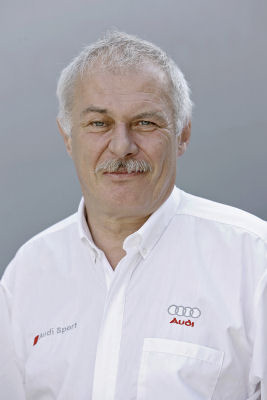
© Audi Sport
"There must be boundaries, of course, that people can afford and it must be useful for our production cars and for the customers who are sitting on the fence trying to decide what they should do and what the future will hold. If we can do this we will also attract the younger people because the message will be clear, understandable and credible. That is the only way I see it going.
"Motor sport must redefine itself but it musn't forget the old rules. I think that's very important. The old way of innovation has been proven and is still valid. Regardless, we must create a clear message for the young people. If not, we will lose the next generation and then we will no longer be relevant."
Baretzky believes motor sport must take a strong leadership role if it is to survive and thrive.
"We should not wait until governments or society put pressure on us to respond," he remarked. "We should show the way so that the world says motor sports people are the only ones we can really believe in because they are credible people who have produced tangible results. The rest of them are just talking or wanting to sell you something. This is our opportunity. It is a huge chance to regenerate the credibility and spirit of motor sport which for sure has suffered a little bit in the last ten years.
"That's our job and our chance in motorsport. We have the credibility with the most efficient cars and the efficiency should be a winning factor. We have to change the rules. In the future it will not be about performance-driven rules. It will be about being efficiency-driven."
The FIA and Formula One will go to a high-tech, stressed member version of the 'Global Racing Engine' in 2013. Baretzky has been talking to the FIA and to F1 team principals about how best to make this move.
"I've had a similar discussion with some guys involved in Formula One," he said. "We were discussing the new rules for 2013. I was invited to join them and I said you have only to make up your mind. Imagine what would happen if two years from now Formula One wouldn't exist anymore? What would happen? Would the world stop turning? And the F1 people thought and said, 'You're right.'
"I said the problem is you live so much in your little world and you don't see the real world outside anymore. You have to take the time to go out and discover what most people really want. It's not the glitz and glamor of Monaco. People have real, daily problems like when they go to the gas station and the price has gone up and consumption has gone up.
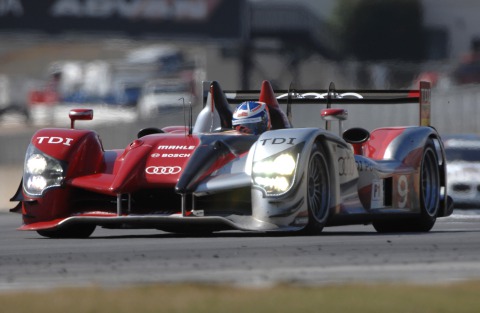
© LAT USA
The biggest challenges are how to control costs and introduce a sensible package of energy recovery systems.
"It's very encouraging to talk to the people in Formula One," Baretzky said. "The only problem is we have to find a way to finance energy recovery systems because the way it is now, nobody can afford it or wants to afford it. We have to find a road map of how to install these things, step by step, so on one hand we have the credibility to be more efficient and on the other hand we make it affordable for the motor manufacturers and for others as well. The FIA and the sanctioning bodies are literally waiting for us to tell them how they should do it.
"None of us has a crystal ball to look at the future," Baretzky added. "You always have to think and talk to each other just to get a little bit of a think tank of what are the others thinking. You have to orient yourself to the bigger world around us beyond the FIA, the ACO, the ALMS and the other racing sanctioning bodies that we do the right things in the right way."
Baretzky sees Audi and Peugeot's successful development of turbo diesel engines as only the first step in racing's new odyssey.
"It must not stop there," he stressed. "Other steps will follow for sure. We have to continue to develop new technologies and the good thing is we at Audi are very much driven by that. Our concept has never been to make entertainment. Even before I came to Audi they were developing the Quattro in rallying and it was done to showcase technological advancement through motor sport and then bring it into production cars. Our credibility was based in that and I think it has continued very well and we have to continue to go down that path.
"The problem now is that we have to convince the governing bodies because they are a little bit unsure what direction to take. They are very open at the moment, whether it's the FIA or the ACO or the ALMS. They are all thinking about efficiency. They want to make efficient racing cars that are energy or fuel-saving, but the question is, how and who should pay?
"That is the other thing, of course, we cannot allow motor sport to go on a spending spree. That is a bad attitude for the manufacturers but also because we will lose the privateers and they are necessary for motor sport. So we must find a very good balance. We must not stop the development but on the other hand we must not go down the road of spending too much so that in a few years all the privateers are driven out. That is the difficult part that must be done."
FIA president Jean Todt appears to have embraced the 'Global Racing Engine' which Baretzky and others would like to see become the basic power plant for all forms of FIA-sanctioned international motor racing
"Everybody is going the four-cylinder route and next year the four-cylinder 'Global Racing Engine' will be in rallying and touring car racing," Baretzky pointed out. "A couple of months ago I met Jean Todt and said I would like to see this engine adapted for every major series the FIA runs. I said this is the future and we will expect to see more and more manufacturers committing to these engines."
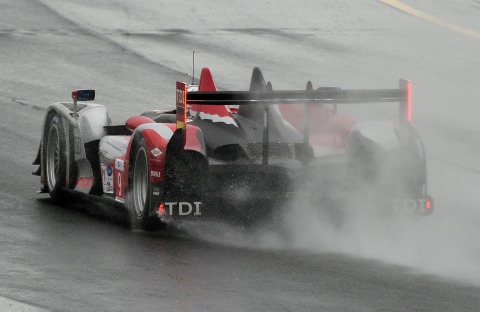
© LAT USA
"We will see all kinds of energy recovery systems, but we have to define them, what you can and cannot do," Baretzky observed. "Maybe we will have to make spec parts in order to make them affordable for the privateers so they can compete on the same level as the factories. This is an area where we will have to move very carefully because at the moment it's very difficult to see where the future is going.
"We will have to find solutions of energy recovery systems that you can bolt on. If they are logically and simply made so you recover not one hundred percent of what is possible but maybe only sixty to seventy percent then you have already achieved something. If we can go to something like that in motor sport with small engines then it could be applied to road cars without big effort.
"This is my conviction and the role I see for motor sports in the future. I see us developing these things and creating an efficiency challenge and making it more sexy to consume a liter less fuel than to have twenty more horsepower."
Baretzky is frustrated that IndyCar failed to embrace the 'GRE' for its 2012 formula. Earlier this year Randy Bernard told me not a single manufacturer was ready to proceed with a 'GRE' in time for 2012, but Baretzky refutes that assertion.
"I told Randy in March at least three of these engines would be ready to run next year. I said, 'Randy you can have at least three engines. They are on the way.' I knew that at the time because the companies had told me about their plans. Each of Citroen, Ford and BMW have these engines. These three engines will be homologated by January 1st in the coming year and six months later the main components will be on the market and available to anyone who wants to buy them.
"I rang Randy and told him you will be able to purchase these engines by the middle of 2011 and you won't have to do anything in terms of development. I told him that his biggest problem is not having engines, but with the rules he has created for 2012 again he has no engines. Other than Honda nobody will do a V-6.
"Racing shouldn't be boring," Baretzky added. "There should be a variety of technical solutions which will attract people who are technically interested and the most efficient car should win. If this message is contained in the rules then we must not be shy and afraid of the future. We have to go there. It will take some effort. It will take a community of common thinking to convince all the Randy Bernards of the world who are not courageous enough to make a decision like that to make this decision for the sake of motor sport."
Baretzky believes it won't be difficult to adapt a turbo four-cylinder 'GRE' to Audi's Le Mans prototype.
"It would be a natural thing to do," he commented. "Natural because if I didn't make a mistake, and I'm pretty sure I didn't with the idea of the GRE, I am convinced that you will be able to win at Le Mans with an engine like that. It will take a little bit of effort. When we made our first diesel engine it took a big effort but we now have the technology for a direct injection engine. It's not a mystery. Twenty-seven years ago a 1.5-liter four cylinder BMW engine won the Formula One world championship. It wasn't a direct injection engine but it was a very sophisticated, production-based engine. So it's possible for sure.
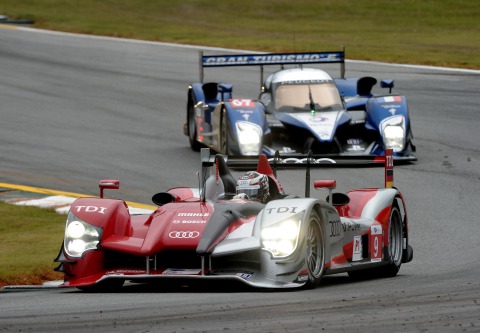
© LAT USA
"It will have to be the same in Formula One and everywhere in motor sport. We will have to look after the efficiency in every aspect, including spending. When we are generating engines like that and we want to have the relevance for our customers then the lifetime of the engine must be long enough to be convincing."
Some critics say a four-cylinder engine is not structurally sound but Baretzky says this problem can be solved. He points to Volkswagen's F3 engine as an example.
"Yes, of course, this is for sure a problem and has always been a problem with a four-cylinder," he related. "But there are methods to overcome that. Three years ago we contributed a lot to making a Formula Three engine for Volkswagen and in the beginning it had a structure around it. I said, why? If you do it the right way with the right materials, and I don't want to go into too much details because Mercedes-Benz always doubted how we made it and how the engine was so much better than theirs. So I don't want to tell them how to do it.
"But we thought very logically about some things and we determined we didn't need a separate structure. And the engine is running very succesfully today and has been running very successfully for some time. Now, I don't say it's the same with a 600 horsepower turbocharged engine. But even if you do make a subframe, where is the problem?"
Baretzky points out that an in-line, four-cylinder provides plenty of room for energy recovery systems.
"Small engines allow us to combine a lot of energy recovery systems. If you want to look at all the efficiency components you want to incorporate in the future, like waste energy recovery systems from the exhaust or the cooling system, then you need a little bit of space on the left and rightside of the engine. A four-cylinder gives you that space but a vee engine is the wrong thing to have because you are so limited in space. You have an exhaust system on both the left and rightside and you also have to double all the energy recovery systems which makes it very heavy, very complicated and very inefficient.
"So it's better to have the hot side on one side of the engine and the cool side on the other side so you can arrange all these things accordingly. That's the opportunity with the four-cylinder. The other thing is a four-cylinder is much shorter than a big V-8 so the size of the engine allows you to work in all directions, fore and aft as well as side to side.
"Having said that, the next step after the four-cylinder will be the three-cylinder and how would you do that with a V-6? Would you make a V-4? That's not really a good solution. It will be an in-line three-cylinder and a lot of these engines are already on the way. BMW has announced a three-cylinder and Volkswagen has one in production.
"In the end, the people driving the car don't care about the number of cylinders. They just want to drive the car and say it's good or not. Then they look at the fuel consumption and if it's good they are happy with it. If you want to have a nice sound from the engine you can generate it electrically. You can have a twelve-cylinder sound according to your accelerator and speed. So what else would you want? An efficient engine with light weight and enough power according to what you require."
Baretzky is extremely skeptical that all-electric cars will become big sellers.
"We have to keep in mind that even in twenty years time ninety-five percent of the existing cars will be strictly the internal combustion engine. How many hybrids and electric cars will be sold in the next fifteen or twenty years? The overall number will not change. There will be a small and growing margin in the years to come, but there will still be an awful lot of strictly internal combustion engines.
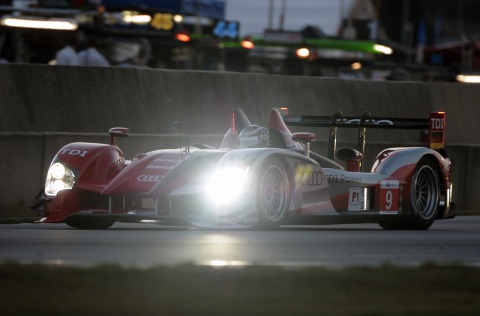
© LAT USA
Baretzky points out that it's very costly to build and dispose of batteries which also create plenty of CO2 output.
"If you look at the price of 200 kilograms of batteries and the additional cost of disposing of them, this a very big problem. The disposal problem is what nobody mentions. You will have to exchange the batteries three times in two years and where will those batteries go? There will be thousands of tons of batteries laying around.
"This is very, very un-green technology. Nobody asks about the CO2 output you generate by creating these batteries. Lithium is not found everywhere. You have to mine it and transport it. It's very expensive and very un-green. So we have to really focus and wipe away all the lies.
"Some people are advertising plug-in electric cars as completely green with no emissions at all. Yes, there are no emissions from the car, but there is a huge amount of CO2 produced by producing and then getting rid of the batteries. And the young people today don't want to be fooled by things like that. It's very dangerous to try to fool them because they are very technologically aware."
Baretzky points out that Porsche's 911 GT3 R hybrid (featured in this space next week) is one way of the future.
"We must have a way of energy-storing like Porsche is doing. Porsche's system is not that heavy and it's not dangerous because when it stops there is no voltage in it and you can drive a few kilometers. For racing that is okay and for most of our customers it's okay as well. What they want is to have an efficient car with a lower consumption compared to what they had before. This purpose is possible and it's what motor sport can develop and showcase to everybody. This is what should happen, but it must be very well-defined."
Finally, Baretzky is a big fan of Ben Bowlby's Delta Wing concept.
"The Delta Wing idea is far too good to ignore," he declares. "It must come to life. The arguments for the Delta Wing are the right ones and if it can be brought to the people in the sport so they understand it, then it will run. If the idea is credible and convincingly good it will run and I believe it is both those things. It looks different and that's a challenge for many people, but how did a car look thirty or forty years ago compared to today's cars?
"Randy Bernard and those guys in IndyCar were not courageous enough and confident enough to say we're going to follow this idea because we believe in it and it's our style to do that. New ideas may not always work but trial and error is mankind's history. As someone said the other day, if you start something you may win or you may lose, but if you don't start then you have lost already."
Amen to Baretzky's outspoken views. I agree with Baretzky that motor racing must adopt his concepts or wither and die.
Auto Racing ~ Gordon Kirby
Copyright 2010 ~ All Rights Reserved
Copyright 2010 ~ All Rights Reserved
Top of Page